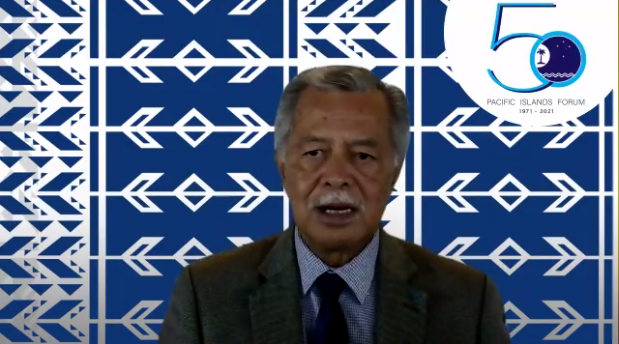Warm greetings from the Blue Pacific region, and thank you for this opportunity to share with you what the Pacific Islands Forum is doing to respond to the climate change crisis and implement the Sustainable Development Goals, to assure our future generations of a resilient future.
The 2021 Sustainable Development Report by Cambridge University confirms that the COVID-19 pandemic has not only created a global health emergency, but also a sustainable development crisis and for us here in the Pacific, the situation is further exacerbated by the pressing impacts of climate change – our region’s single greatest threat.
In this context, my focus today would be on three key messages:
i). our climate change reality in the Pacific;
ii). our work as a region to combat the climate change crisis and implement Sustainable Development Goals; and
iii). what we must see from governments and the global community within this decade if humanity is to secure our collective future.
Our climate change reality in the Pacific
For the Pacific, climate change is our every day, lived reality.
It’s an existential threat for many of our island countries, affecting the core elements of Pacific peoples’ wellbeing and livelihood. For nearly 20 years, as a former pearl farmer, I have personally experienced the turbulent impacts of climate change in one of the most remote atolls in the Pacific—my island of Manihiki.
No doubt there are many similar personal experiences from the island participants in this Summit.
Last year alone, the economic losses from climate-induced disasters in the Pacific were around 1 billion US dollars. In a span of a few years, there were five category 5 cyclones that wreaked havoc on our island homes, causing economic damages ranging from 31 to 63 percent of national GDP for affected countries.
And at the current warming level of 1.2 degree Celsius, our seas are rising with a significant threat to our island countries’ sovereignty. These existential challenges have been worsened by the prolonged impacts of COVID-19, placing significant stress on fragile national economies, especially those reliant on tourism arrivals.
Regional initiatives to combat the climate change crisis
Excellencies, to secure the future of our Blue Pacific, the Leaders of the Pacific Islands Forum are pursuing regional solutions recognising that each of our nation’s futures, as well as the actions we choose to take, are interconnected.
We are defining the collective future we want for our children through the development of our 2050 Strategy for the Blue Pacific. This collective vision will put climate change at the centre of our development plans and together, we will take ownership of and collectively respond to pressing challenges ahead.
Last month our Leaders endorsed a Declaration on preserving maritime zones in the face of climate-related sea level rise. This is indeed a turning point, a significant development, fundamental to our collective effort to influence international discourse and responses to the issue of climate-related sea-level rise.
To address the significant imbalance in global climate finance allocation to adaptation, we have launched an innovative and forward-looking Pacific Resilience Facility. This facility will provide small grants to build community resilience and adaptive capacity against climate and disaster risks. We know that every 1 dollar spent on preparedness saves up to 7 dollars of recovery costs. We know what can work in our context, and we know the Pacific Resilience Facility is our homegrown solution. We therefore invite donors and development partners, to join us on this journey.
Our Leaders also recognise the importance of multi-stakeholder engagement towards resilience building through the Framework for Resilient Development in the Pacific and its complementary Pacific Resilience Partnership.
While we continue to nurture these home-grown solutions, we also recognise the importance of preparing our countries well in advance of COP 26 to meaningfully participate and influence a stronger outcome from the Glasgow meeting. We are working together to support COP 26 Political Climate Champions advance our region’s priorities in the negotiations.
Support required from governments and global community
So what do we want to see from governments and the global community? In short, Urgent action. And ambitious action.
As confirmed by the latest IPCC report, the window to act to safeguard the future of our Blue planet and avoid a more catastrophic event than this current pandemic is closing fast. This is, indeed, the defining decade to act now.
To the global community, we want to see real and tangible commitment to upholding the goals of the Paris Agreement. The Paris Agreement is not just a political tool – it is a roadmap for our very survival. The Rulebook must be finalised at COP 26.
No doubt there is renewed global focus and progress on climate action over the past months. Yet these are insufficient. On the current trajectory, our coral reefs would be decimated and many of our low-lying atoll islands would be uninhabitable within our lifetime.
Excellencies, we can have all the commitment and talk in the world, but without real, actual action, particularly by the wealthy and global major emitters, the world will surpass the 1.5-degree threshold within the next decade. This is not the future we want for our children.
In closing, we cannot understate the urgency of what we must achieve at COP 26. It must deliver the required ambition, financing, and action towards a net-zero carbon by 2050, a 1.5-degree future that will safeguard our children and grandchildren.
For us in the Pacific climate change is not a debate. It is a matter of survival and every day of inaction brings us one step closer to a perilous future which could well see many of our homes disappear. But we will not relent. We will not give up. We will do all that is possible to fight for our Blue Pacific, and for this one planet we all call home.
SOURCE: PIFS/PACNEWS


















